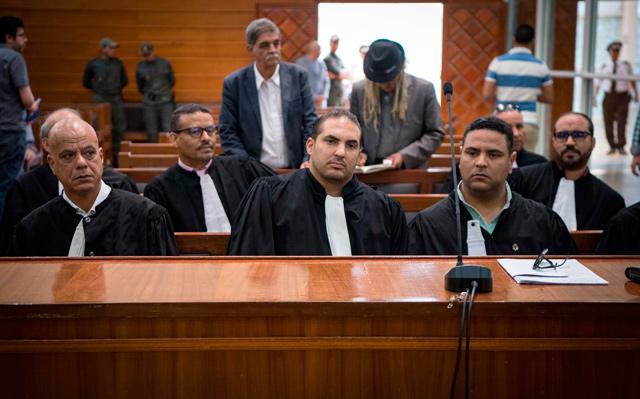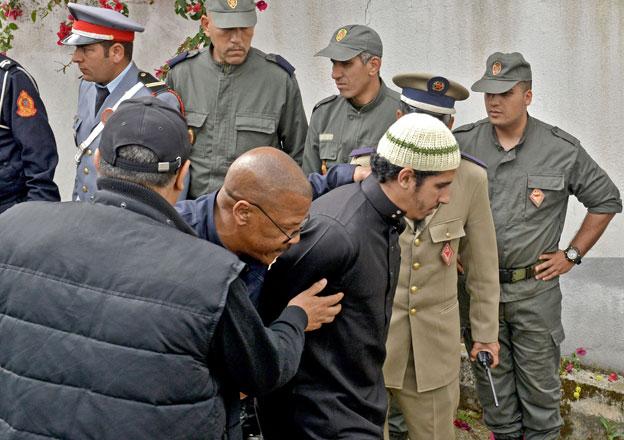You are here
Morocco trial for murder of Scandinavian hikers nears verdict
By AFP - Jul 12,2019 - Last updated at Jul 12,2019
SALÉ, Morocco — The trial of the suspected extremist killers of two Scandinavian women hikers beheaded in Morocco's High Atlas mountains neared its end on Thursday with lawyers' final arguments.
Journalists flocked to the court where the trial of the 24 suspects reopened for what could be its last day, in a case that shocked the North African country.
Prosecutors have called for the death penalty for the three main terrorist suspects behind the "bloodthirsty" murder of the young Scandinavians in December.
The maximum sentence was sought for 25-year-old suspected ringleader Abdessamad Ejjoud and two radicalised Moroccans, although the country has had a de facto freeze on executions since 1993.
Petitions on social media have called for their execution.
The three admitted to killing Danish student Louisa Vesterager Jespersen, 24, and 28-year-old Norwegian Maren Ueland.
The prosecution has called for jail terms of between 15 years and life for the 21 other defendants on trial since May 2 before an anti-terror court in Sale, near Rabat.
The accused will be able to speak before deliberations, according to the lawyers.
The life sentence has been sought for Abderrahim Khayali, a 33-year-old plumber, who had accompanied the three alleged assailants but left the scene before the murders.
The prosecution called for 20 years in jail for Kevin Zoller Guervos, a Spanish-Swiss convert to Islam.
The only non-Moroccan in the group, Guervos is accused of having taught the main suspects how to use an encrypted messaging service and to use weapons.
His lawyer, Saskia Ditisheim, said Guervos’ “most basic rights had been trampled” in a letter to the Swiss foreign ministry, regretting that he had not had “consular protection”.
All but three of those on trial had said they were supporters of the Daesh terrorist group, according to the prosecution, although Daesh itself has never claimed responsibility for the murders.
The three killers of the women were “bloodthirsty monsters”, the prosecution said, pointing out that an autopsy report had found 23 injuries on Jespersen’s decapitated body and seven on that of Ueland.
Ejjoud, an underground imam, confessed at a previous hearing to beheading one of the women and Younes Ouaziyad, a 27-year-old carpenter, the other, while Rachid Afatti, 33, had videoed the murders on his mobile phone.
The defence team said it would call for the judge to take into account extenuating circumstance.
“We will appeal for mitigating circumstances on account of their precarious social conditions and psychological disequilibrium,” Hafida Mekessaou told AFP.
Coming from modest backgrounds, with a “very low” level of education, the defendants lived for the most part in low-income areas of Marrakesh.
Khalid Elfataoui, representing Jespersen’s family, said she would read out a “devastating” letter received from the Danish woman’s family and demand compensation of 10 million dirhams (just over $1 million) on their behalf.
The Norwegian woman’s family has declined to take part in the trial.
‘Failure to monitor’
Jespersen’s lawyers have accused authorities of having failed to monitor the activities of some of the suspects before the two women had their throats slit while camped in an isolated mountain area.
The brutal killings could have been spared had authorities heeded information on the behaviour of street vendor Ejjoud, they said.
A response from the Moroccan judicial agent is expected on Thursday.
The alleged ringleader, who had been convicted for trying to join Daesh in Syria, was released early from prison in 2015 and went on to meet former inmates and other individuals without checks by authorities, attorney Khaled El Fataoui said.
He alleged police had been informed of the activities of the group of men but failed to act.
Lawyer Houssine Raji added the suspects met in Koranic schools run by cleric Mohamed Al Maghraoui, which had been shut in 2010 under a court decision but ordered reopened in 2012 by the justice minister.
Investigators have said the “cell” was inspired by Daesh ideology, but Morocco’s anti-terror chief insisted the accused had no contact with the militant group in conflict zones.
Related Articles
SALÉ, Morocco — Three Daesh group supporters were sentenced to death by a court in Morocco on Thursday over the beheadings of two Scandinavi
SALÉ, MOROCCO — Moroccan prosecutors on Thursday called for the death penalty for the three main extremist suspects on trial for the "b
SALE, Morocco — The appeal opened on Wednesday in the case of 24 men convicted over the beheadings of two young Scandinavian women on a hiki













